Find free New Hampshire divorce records today.
Such records are available to the public and can be searched by individuals through various state sources. These documents contain a great deal of information about the case, divorcees, circumstances of the divorce, where and when it took place, and other matters like child custody, division of assets, and child support.
Obtain free divorce records in New Hampshire from multiple sources, such as city clerks, the state’s Vital Records Administration, and the court where the separation originally took place. Detailed instructions on searching for and obtaining these divorce records will be provided throughout this resource.
Can Everyone View Divorce Records in the State of New Hampshire?
Since divorce records are also a type of court records, the state of New Hampshire considers them public records, and anyone can access them. The New Hampshire Judicial Branch, the state department, which includes all courts of the state, has given special guidelines for the public to access court records.1
Divorce records are documents that announce a couple’s dissolution of marriage. It is important to keep in mind that these records primarily comprise two separate documents: the divorce certificate and the decree. The certificate of divorce is a simple single-sheet document that confirms that the marriage dissolution has indeed taken place.
However, the divorce decree is a much more detailed court record that contains complete information about the separation, both the divorcees and why it took place, as well as other matters such as custody of children, division of assets, child support, alimony, etc.
Divorce records that include solely the certificate of separation are much easier to obtain in the state of New Hampshire.2 There are a variety of departments in the state that offer to provide these documents to any researcher looking for them for any purpose whatsoever. However, in some cases, sensitive information may be exempted from the records to protect the privacy of the people involved in the divorce.
On the other hand, the decree of the divorce is a detailed document that is considered private and confidential by the court.3 Only selected individuals can have access to these divorce papers, which include:
- The divorcees themselves.
- Any member of the divorcees’ immediate family, which includes brother, sister, father, mother, grandfather, grandmother, nephew, and niece. (Cousins are not included)
- Legal representatives who are directly linked to the divorcees. (Proof must be given that they have the right to represent the parties)
- Any spouse of the divorced person.
The court that handled the separation case in New Hampshire can be contacted for the decree of the divorce. Upon request of the document, the court may ask for proof of relation or proof of representation.
However, divorce records are made completely public once 50 years have passed since the date it was finalized.
How To Access New Hampshire Divorce Records Free of Charge
A researcher can request divorce records in New Hampshire from the state’s Division of Vital Records Administration. The records can be accessed through an online portal, by mail, or in person from the department’s office.
For ease of citizens, the Vital Records Administration of New Hampshire has launched the NHVRIN Web tool that allows them to access birth records, death records, marriage records, and, of course, divorce records.
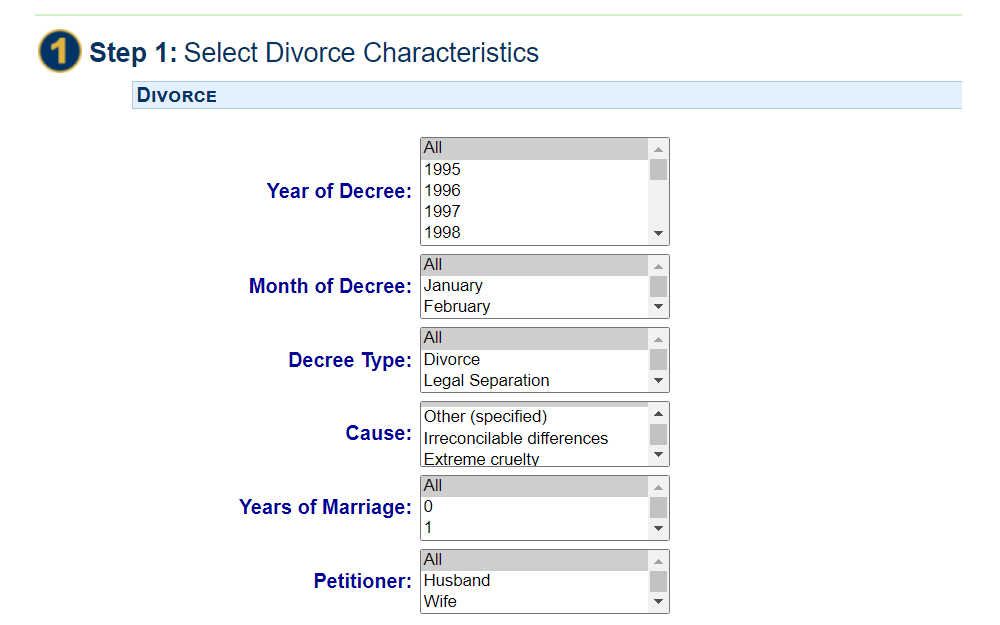
A searcher can also request divorce records by visiting the office of the New Hampshire Division of Vital Records in person. The office is located at:
New Hampshire Division of Vital Records Administration
9 Ratification Way (formerly 71 S Fruit St.)
Concord, NH 03301-2410
Email: [email protected]
Phone: 603.271.4650
An Application for a Certified Copy of a Vital Record will have to be filled out by the requestor. The office may also ask for identification and some proof of being related to the divorcee or of legally representing them. The Vital Records Administration of New Hampshire charges a fee of $15 for the first certified copy of the records and $10 for every additional copy.
Citizens can also request divorce records by mail. The complete form, along with the fee of $15 (only in US funds) and photo identification, will have to be posted to the following address:
New Hampshire Department of State
Division of Vital Records Administration
Registration/Certification
9 Ratification Way
Concord, New Hampshire 03301-2455
Phone: 603-271-2236
It is also important to note that the New Hampshire Vital Records Administration has a specific access policy that has all the limitations on who can access the records and who cannot.5 The complete list of limitations (RSA 5-C:9) can be checked out through the official website of New Hampshire Courts.6
Another way of obtaining divorce records in New Hampshire is by contacting the court that handled the separation case. The local clerk’s offices keep records of all cases that are heard in these courts. Since divorce records also come under court records, they can be obtained by contacting the specific courthouse in which the dissolution took place.
In the state of New Hampshire, divorce cases were handled by the superior courts. However, after the formation of the family division, the jurisdiction over separation cases was transferred from the superior court to the family division. There are a total of 11 superior courts and 28 family divisions in the state of New Hampshire.
A researcher can check out the “Find Court Page” of the New Hampshire Judicial Branch to learn where the courts are located in their city.
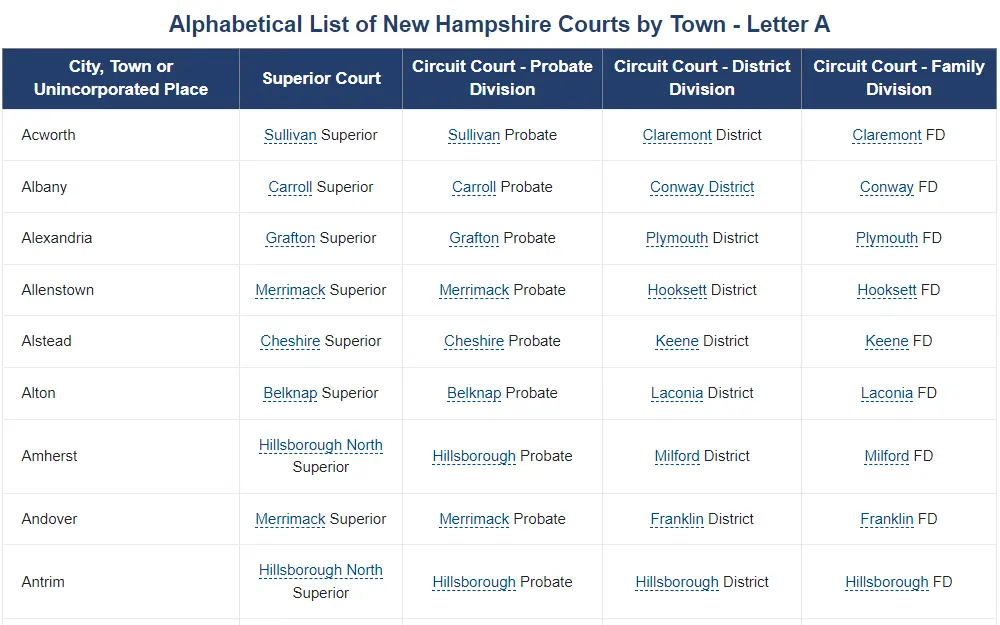
Once the relevant court (where the divorce took place) is located, the researcher can visit its clerk’s office in person to request the records. The clerk’s offices are usually open Monday to Friday from 8 AM to 5 PM.
A NHJB-2205-F form will have to be filled out by the requestor, and a fee of $40 for the decree of the divorce or $10 for the Vital Statistics Form will be paid to obtain the required records.
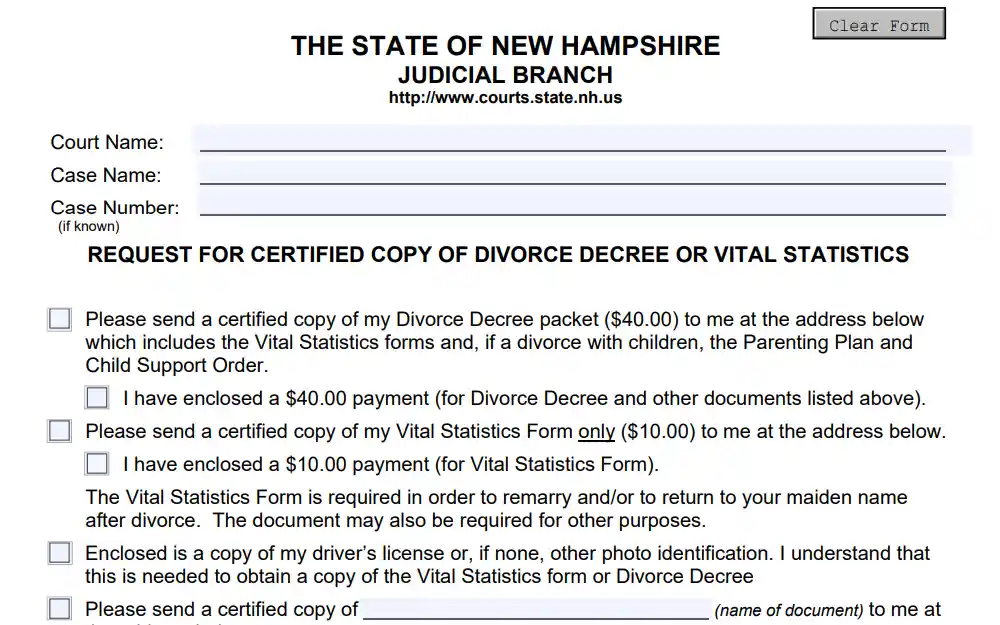
It is important to note that the New Hampshire courts have certain guidelines for requesting divorce records. Divorce records in New Hampshire can also be requested by posting the completed Vital Records request form, the fees as mentioned above, and some kind of photo identification (driver’s license, passport, federal documents, etc.) to the following address:
Judicial Branch Administrative Offices
New Hampshire Circuit Court
1 Granite Place, Suite N400
Concord, NH 03301
Phone: 603-271-6418
Another way to access and request court records pertaining to divorces in New Hampshire is by contacting the town or city clerk. This will be outlined in the section below.
Viewing Divorce Records Hosted by Cities Within NH
Searching for New Hampshire divorce records at the city level can provide the researcher with broader, more comprehensive results. Primarily, divorce records can be obtained either from the family division court of the city or the city clerk’s office.
The New Hampshire Vital Records Information Network (NHVRIN) is a state database that has the vital records (including divorce records) of all towns and cities.9 A researcher can request their town or city clerk for specific divorce records, who will then access this database to provide the records.
There are around 234 town or city clerks in New Hampshire, and their contact details can be found on the Office of Planning & Development website.10 The methods and fees to retrieve records from the town or city clerks may differ from one location to another.
City of Manchester: To obtain divorce records in Manchester, New Hampshire, the researchers can contact the family division of the city in person, through call, or by post at the following credentials:
New Hampshire Circuit Court
9th Circuit – Family Division – Manchester
35 Amherst Street
Manchester, NH 03101-1801
Phone: +1-855-212-1234
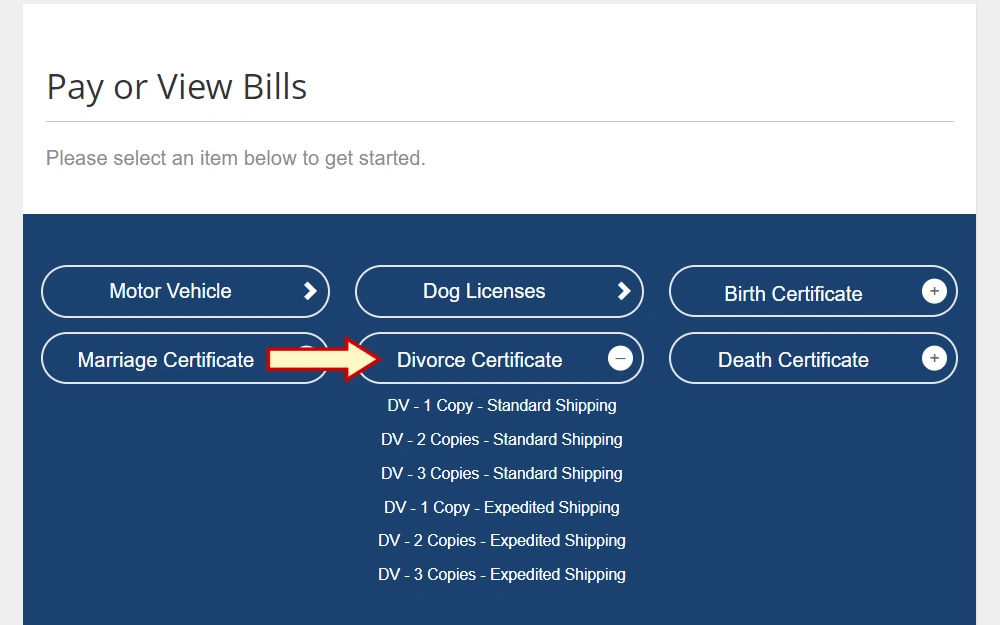
The researcher can also reach out to Manchester City Clerk for divorce records. An Application for Certified Copy of Divorce Records will have to be filled out and mailed to the following address.
Manchester City Clerk
1 City Hall Plaza
Manchester, NH 03101
Phone: +1-603-624-6455
A Documentary Evidence Form will have to be filled additionally. The office will charge a fee of $15 for the first copy and $10 for each additional copy.
Nashua City: To track down divorce records in Nashua, New Hampshire, the researchers can contact the family division in person, through call, or by post at the following credentials:
New Hampshire Circuit Court
9th Circuit – Family Division – Nashua
30 Spring Street, Suite 102
Nashua, NH 03060
Phone: +1-855-212-1234
The researcher can also reach out to Nashua’s City Clerk for divorce records at:
Nashua City Clerk
229 Main Street 102
Nashua, NH 03060
Phone: +1-603-589-3010
An application form (for the editors: the application form wasn’t available on their gov’s site) will have to be filled and the requestor will submit a non-refundable fee of $15 to obtain the records.
Concord City: To acquire divorce records in Concord, New Hampshire, the researchers can contact the family division in person, through call, or by post at the following credentials:
New Hampshire Circuit Court
6th Circuit – Family Division – Concord
32 Clinton Street
Concord, NH 03301
Phone: +1-855-212-1234
Citizens can also obtain divorce records from the Concord City Clerk’s Office. An Application Form will have to be filled out along with Documentation Evidence and posted at:
Concord City Clerk
41 Green Street
Concord, NH 03301
Phone: +1-603-225-8500
A fee of $15 for the first copy and $10 for every additional copy will be charged by the department. Researchers can also request the records online through the EB2 tool. Searchers can also find information about archived marriage records for genealogy and lineage purposes.
Finding Free Divorce Archives in New Hampshire for Genealogy Purposes
Older or archived divorce records can be searched for genealogy purposes, historical research or out of curiosity through different government departments depending on the year the divorce occured. The New Hampshire government has given a complete guide to acquiring vital records for your convenience.12
To search for a divorce index of separations that took place before 1905, the respective clerk’s office of the city where the separation took place can be contacted. A searcher can find a complete list of all city clerk offices in New Hampshire, along with addresses and phone numbers to contact them.
For divorces that took place after 1905, the New Hampshire Department of Health, Division of Vital Records can be visited in person at the following address:
Vital Records & Health Stats
9 Ratification Way,
Concord, NH 03301
Phone: 603-271-4651
The department will charge a fee of $15 for each copy of the records.
Are Common Law Marriages & Divorces Recognized in the State of New Hampshire?
A common law marriage or a common law divorce is only recognized to a very limited extent in the state of New Hampshire.13
According to RSA 457:39, these marriages or divorces (it is important to note that the word “cohabitation” has been used in the text of the law and not “common law marriage”) can only be recognized for the purpose of inheritance after one of the spouses dies, that is after certain conditions are met.14
The couple must have been living together for at least a period of three years and introducing themselves as husband and wife in social settings before the death of one of them.
In the state of New Hampshire, the union of two people must be in accordance with RSA chapter 457 to be called legal marriage. However, if two people have been living together for at least 3 years as husband and wife without any formal marriage ceremony and one of them dies, the other may request the court to recognize their relationship as a formal marriage for inheritance purposes.
How To Find Dissolutions of Marriage in NH
To find information regarding the dissolutions of marriages, a researcher can search the New Hampshire Vital Records Information Network database online.
In addition to that, the clerk’s office of the city where the divorce took place can be contacted for records. Another option that can be used if both aforementioned do not have the desired records is contacting the superior court or family division of the city where the separation originally took place.
How To Apply for a Divorce & Respond to Divorce Notices (New Hampshire)
In the state of New Hampshire, to get a divorce, the citizen will have to file a court petition in the Family Division of the city or town where they or their spouse lives. If both parties agree on getting separated, a Joint Divorce Petition can be filed, along with a Personal Data Sheet.
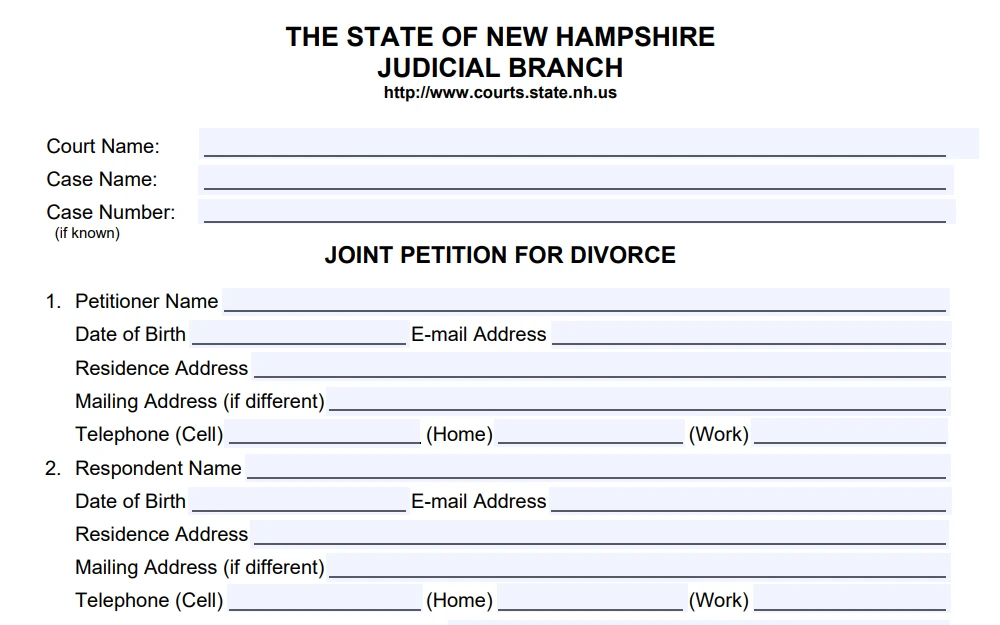
However, if only one person wants to get separated, a simple Divorce Petition can be filed, this too with a Personal Data Sheet. The New Hampshire Courts have a detailed fee structure that includes all the dues. The filing fee for a Divorce Petition in the state of New Hampshire is $250, which can be paid by cash, check, or money order.
Along with these, the following documents and disclosure forms will have to be filed as well:
For a couple that has children, additional documents will have to be filed, which include the following:
- Certificate of the Child Impact Seminar
- Parenting Plan
- Uniform Support Order
- Child Support Guidelines Worksheet
A citizen can also file a petition for annulment or mensa et thoro in court according to the circumstances.
Once the petition is filed, the person will have to serve a summon to their ex-wife or ex-husband in person, through publication, or by mail. If the other party does not respond to the summon within the given time frame, the petitioner may be given a default divorce on the first hearing.
In case a citizen is served a divorce notice, they should first thoroughly go through the conditions of the separation proposed. A divorce attorney can be hired to explore options. It is extremely important that the person who is being served the summons responds to it in the given time.
Once answered, the court will conduct hearings to finalize the divorce and decide on matters like child custody, alimony, division of assets, and child support.
With the help of the resources mentioned in this article, searchers can effectively and efficiently find New Hampshire divorce records from official sources. Anyone can access further information as well, by utilizing either the New Hampshire marital record lookup tutorial or the free NH public record search overview for details of court cases, property ownership, background checks, arrests, and more.
References
1New Hampshire Judicial Branch, State of New Hampshire. (n.d.). Guidelines for Public Access to Court Records | New Hampshire Judicial Branch. Retrieved November 14, 2023, from <https://www.courts.nh.gov/guidelines-public-access-court-records#:~:text=A%20presumption%20exists%20that%20all,provision%20granting%20or%20requiring%20confidentiality.>
2New Hampshire Judicial Branch, State of New Hampshire. (2023, September 07). Divorce Certificates and Divorce Decrees. NH Law Library. Retrieved November 14, 2023, from <https://courts-state-nh-us.libguides.com/divorcecertificatesdecrees#:~:text=The%20divorce%20certificate%20is%20available,Superior%20or%20Family%20Division%20courts.>
3City of Manchester. (n.d.). Divorce Certificate. The City of Manchester, NH. Retrieved November 14, 2023, from <https://www.manchesternh.gov/Departments/City-Clerk/Vital-Records-and-Genealogy/Divorce-Certificate#:~:text=Confidentiality,to%20the%20public.>
4Division of Vital Records Administration, State of New Hampshire. (n.d.). NH – IVS : Divorce Query. NHVRIN Web. Retrieved November 14, 2023, from <https://nhvrinweb.sos.nh.gov/nhivs_divorce_query.aspx>
5New Hampshire Secretary of State, State of New Hampshire. (n.d.). NH-SOS – Access Policy. Retrieved November 14, 2023, from <https://sos.nh.gov/archives-vital-records-records-management/vital-records/access-policy/>
6The General Court of New Hampshire, State of New Hampshire. (2021, July 24). Section 5-C:9 Disclosure of Information From Vital Records. Retrieved November 14, 2023, from <https://www.gencourt.state.nh.us/rsa/html/I/5-C/5-C-9.htm>
7New Hampshire Judicial Branch, State of New Hampshire. (n.d.). A to Z List of New Hampshire Courts by City, Town or Unincorporated Place. Retrieved November 14, 2023, from <https://www.courts.nh.gov/your-visit/find-court/nh-towns-z>
8New Hampshire Judicial Branch, State of New Hampshire. (2015, August 01). Request for Certified Copy of Divorce Decree or Vital Statistics. Retrieved November 14, 2023, from <https://www.courts.nh.gov/sites/g/files/ehbemt471/files/documents/2021-04/nhjb-2205-f.pdf>
9Division of Vital Records Administration, State of New Hampshire. (n.d.). NHVRIN : FAQ. NHVRIN Web. Retrieved November 14, 2023, from <https://nhvrinweb.sos.nh.gov/nhivs_faq.aspx#:~:text=NHVRINweb%20is%20an%20interactive%20query,%2C%20deaths%2C%20marriages%20and%20divorces.>
10NH Department of Business and Economic Affairs. (n.d.). Welcome – NH Economy. BEA. Retrieved November 14, 2023, from <https://www.nheconomy.com/office-of-planning-and-development>
11City of Manchester. (n.d.). Pay or View Bills. The City of Manchester, NH. Retrieved November 14, 2023, from <https://www.invoicecloud.com/portal/(S(g3noouviptk3dkbaz5ihzpqh))/2/Site.aspx?G=941d0a91-b2d1-40f2-8732-9a256a1df413>
12The Library of Congress. (n.d.). Research Guides: New Hampshire: Local History & Genealogy Resource Guide: Vital Records. Retrieved November 14, 2023, from <https://guides.loc.gov/new-hampshire-local-history-genealogy/vital-records#:~:text=Contact%20the%20New%20Hampshire%20Department,using%20their%20online%20order%20form.>
13New Hampshire Judicial Branch, State of New Hampshire. (2023, November 7). Common-law Marriage: Read The Law About … New Hampshire Cases. NH Law Library. Retrieved November 14, 2023, from <https://courts-state-nh-us.libguides.com/c.php?g=889195&p=6392169#:~:text=New%20Hampshire%20Cases,-In%20re%20Mallett&text=%22In%20New%20Hampshire%2C%20marriage%20is,the%20spouse%20of%20the%20deceased.%22>
14The General Court of New Hampshire, State of New Hampshire. (n.d.). New Hampshire Statutes – Table of Contents. Retrieved November 14, 2023, from <https://www.gencourt.state.nh.us/rsa/html/NHTOC/NHTOC-XLIII-457.htm>
15New Hampshire Judicial Branch, State of New Hampshire. (2021, April 30). Joint Petition for Divorce. Retrieved November 14, 2023, from <https://www.courts.nh.gov/sites/g/files/ehbemt471/files/documents/2021-04/nhjb-2058-f.pdf>
